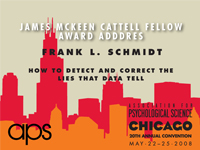Moving Forward with IRBs: Best Practices
When the Columbine High School tragedy struck, APS Fellow and Charter Member Roxane Cohen Silver, University of California, Irvine, needed immediate access to the survivors to carry out her disaster trauma research. The UC Irvine Institutional Review Board (IRB) approved her research in a matter of days, via email, and she was able to collect crucial data to help understand how victims cope with trauma. If you’re familiar with IRBs in general, you might be thinking, how in the world was she able to do this?

Silver, along with APS Fellows Robert Remez, Barnard College; Bennett Bertenthal, University of Indiana; and Felice Levine (also an APS Charter Member), American Educational Research Association, talked about IRB best practices in a symposium chaired by APS Fellow Philip Rubin, Yale University and Haskins Laboratory. The panelists shared their experiences working with and serving on IRBs and advised the audience on how to foster a more conducive atmosphere for research.
Silver’s research on disaster and traumatic stress necessitates immediate data collection in order to identify early predictors of long-term difficulties. Naturally, any IRB would be concerned about the ethics of interviewing and testing people who’ve just been through a tragedy. Silver went through all of these considerations with her IRB, which trusted that such research should and can be done well. She put a number of safeguards in place (look for an upcoming Observer piece by Silver for details), which generally results in very successful participation rates and no harm to subjects. She let the audience in on the strategy that enabled her application to get approved within 48 hours: her IRB already had a generic protocol for her research program on file, which allows her to submit detailed modifications when a disaster happens. This is the stunning result of a true collaboration between a researcher and an IRB.
Remez has been on both sides of the coin — he’s a researcher at Barnard and has served on his IRB. This experience has afforded him a well-rounded perspective on the issue, and he talked about a number of things that have helped his IRB to run more smoothly. One was to assign the review of student projects pursued in coursework to standing departmental committees to help alleviate the IRB’s burden.
Bertenthal has a unique history with IRBs, having turned around the University of Chicago IRB from a dysfunctional entity to one of today’s most well-respected boards. He emphasized the importance of appointing the right IRB manager and the right faculty to the committee. And, of course, without institutional commitment none of this collaborative effort would succeed. So it’s worth reminding your institution that their support has far-reaching implications for all involved. A major factor in the success of the Chicago IRB is a user-friendly website, which includes an online protocol submission system (IRB Wise: http://humansubjects.uchicago.edu/sbsirb/).

Levine gave a broad overview of fairness in research practice and the regulatory system. She emphasized that the review process must be viewed as clear, fair, consistent, accurate, and provide the opportunity for appeal (which is not the norm). IRBs need to be more transparent in their decisions, and institutions can create a climate that engenders commitment and compliance. Levine then presented four models for reform, including 1) decentralizing the IRB, 2) expediting review, 3) limiting review of public use data files, and 4) enhancing educative functions of IRBs. She also called on the federal Office of Human Research Protection to provide a more supportive environment for both researchers and IRBs.
Altogether, the panelists advanced the dissemination of best practices for working with IRBs, and encouraged the psychological science community to do the same. The panelists’ presentations can be viewed on the APS website at www.psychologicalscience.org/advocacy/irb.




APS regularly opens certain online articles for discussion on our website. Effective February 2021, you must be a logged-in APS member to post comments. By posting a comment, you agree to our Community Guidelines and the display of your profile information, including your name and affiliation. Any opinions, findings, conclusions, or recommendations present in article comments are those of the writers and do not necessarily reflect the views of APS or the article’s author. For more information, please see our Community Guidelines.
Please login with your APS account to comment.